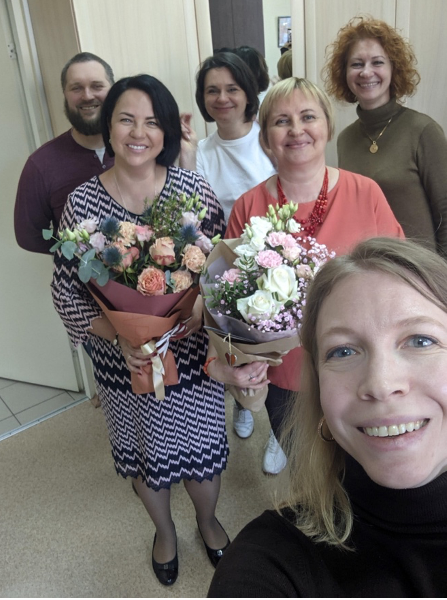Core and Cohort Updates
Admin Core
Although this summer has been particularly hot and rainy in Boston, the Admin Core has kept busy in and out of the office.
The Admin Core team has spent many hours in the URBAN ARCH sample repository preparing for, sending, and receiving sample shipments. This summer, the samples stored at Boston Medical Center were sent to the University of Toronto, the Cleveland Heart Lab, Boston University, United States Drug Testing Laboratories (USDTL), and the University of California San Francisco (UCSF). A large shipment of DBS cards was also received from Mbarara, Uganda. For more information on the URBAN ARCH sample repository, please visit our webpage. If you have questions regarding the URBAN ARCH repository, please contact Natalia Gnatienko.

The admin core is sad to say goodbye to one of our team members, Anna Martin. Anna left URBAN ARCH to work as a Community Engaged Intervention Facilitator with the NIH-supported MA HEALing Communities study. We wish her the best of luck and thank her for all of her hard work!
The URBAN ARCH Admin Core is preparing for the next DSMB meeting, and looks forward to receiving valuable feedback from DSMB members on September 28, 2021.
The Admin Core is excited to highlight our recent publication “Heavy alcohol use among women and men living with HIV in Uganda, Russia, and the United States” by Gnatienko et al., as our article spotlight.
BDM Core
The BDM Core is actively involved in several URBAN ARCH manuscripts currently in progress. These include the main analyses from each of the Russia, Boston and Uganda cohorts. In addition, the core has begun preparing reports for the fall Data Safety Monitoring Board meeting in September.
Uganda Cohort
ADEPTT
The ADEPTT study concluded enrollment in January of 2020 with 302 participants, including 155 females and 147 males. Of these, 200 are current alcohol drinkers and 102 are alcohol abstainers. To achieve our enrollment, we screened 1,434 patients from the Mbarara ISS Clinic, of whom 1,312 were consented for further screening for latent TB. Out of 1,192 PPD placements completed, 308 (26%) participants had positive results for latent TB and were eligible for the study and 302 enrolled.
All data collection for the ADEPTT study ended on April 1, 2021. We completed baseline procedures for all 302 participants enrolled, 295 month-3 visits, 292 month-6 visits, 289 month-12 visits, 271 month-18 visits, 170 month-24 visits, 134 month-30 visits, 78 month-36 visits, and 35 month-42 visits. Twenty-six participants discontinued TB preventive therapy (INH) due to grade 3/4 level toxicities and three women discontinued INH due to being pregnant. We are in the process of completing analyses and the manuscript for the ADEPTT main aims.
We received the notice of award for Year 2 of our COVID-19 administrative supplement looking at changes in alcohol use, ART levels, and viral suppression before, during, and after stay-home restrictions in PLWH in Uganda and Boston. As of September 1, 2021, we have enrolled 106 out of a target of 125 participants in the Uganda cohort and enrollment and follow-up activities continue going on well.
DIPT
The main aims of this randomized controlled trial (the DIPT study) are to examine whether economic incentives provided to HIV/TB co-infected heavy drinkers can reduce alcohol use and increase adherence to isoniazid preventive therapy (IPT). As of September 1, 2021, we have met our enrollment target and concluded with 680 participants enrolled. We screened 5,503 individuals, of whom 4,098 were further screened to determine heavy drinking status using the point-of-care ethyl glucuronide (EtG) test. Out of the 4,098 who completed EtG testing, 1,998 (49%) were EtG positive. Of those who were EtG-positive, we placed 1,786 purified protein derivative (PPD) skin tests to confirm latent TB status. From this, 687 (40%) participants had positive results for latent TB and were eligible for the study. Overall, we have enrolled 680 participants who are EtG-confirmed heavy drinkers with latent TB. Follow-up of the last enrolled participant is expected to conclude by July, 2022.
EXTEND
The main aims of the EXTEND RCT are to estimate the uptake and acceptability, preliminary efficacy, and cost of methods of delivery of an intervention to reduce unhealthy drinking and HIV viral failure among persons in HIV care in rural Uganda (n=270). We concluded enrollment in December, 2020 with 273 participants, (270 participants plus 3 pilot participants). Of the 273 participants enrolled in the RCT, 181 were male and 92 were female, 91 were randomized to arm 1 (in-persons counseling plus live call boosters); 91 were randomized to arm 2 (in-person counseling plus automated boosters); and 91 were randomized to arm 3 (standard of care, wait-list control). Participants in arm 2 (automated boosters) were given a choice between Interactive Voice Response (IVR) or Short Message service (SMS) messages for their booster sessions and approximately two thirds (65) of them chose IVR while about one third (29) of them chose SMS as their preferred automated booster message delivery option.
We are coding qualitative data from post-intervention interviews and completing analyses and manuscript writing for the costing data, and lessons learned with the study implementation.
Russia Cohort
The St PETER COVID study continues to recruit participants from the St PETER parent study. As of September 1, 2021, a total of 244 participants completed the study assessment, which aims to evaluate the effects of the pandemic on alcohol and tobacco use.
As of September 1, 2021, the PETER PAIN UH3 study randomized 39/45 participants into one of three arms: gabapentin, low-dose naltrexone, or placebo. The aim of the study is to assess the effectiveness of novel pharmacotherapies to improve chronic pain among HIV-positive heavy drinkers.
With news of the continuation of URBAN ARCH via the International URBAN ARCH Center, the team has been actively preparing for the initiation of the St PETER HIV TB study, which is one of the research projects in the Center. The team has received IRB approval and is actively working on developing study protocols, standard operating procedures, assessments, and tracking forms. We look forward to launching the study in the spring.



The team is actively pursuing data analyses, abstract submissions, and manuscript preparation.
Conference Posters:
- Tindle HA, et al. Results from a randomized controlled trial of smoking cessation medications for alcohol reduction among HIV-positive heavy drinkers and daily smokers in St. Petersburg, Russia. Poster at International AIDS Society 2021.
- Mensah SO, et al. Alcohol, HIV and trimethylamine-n-oxide (TMAO) levels. Poster #339 at RSA/ISBRA-2021 Scientific Meeting.
- Tandon S, et al. Whole metagenome sequencing to explore change in abundance of butyrate-producing genes in gut microbiota of people with HIV who reduce alcohol consumption. Poster #265 at RSA/ISBRA-2021 Scientific Meeting.
- Singhal R, et al. Microbial dysbiosis in people living with HIV (PLWH) who are heavy alcohol drinkers is marked by a decrease in butyrate producing bacteria. Poster #174 at RSA/ISBRA-2021 Scientific Meeting.
- Ghare S, et al. Targeted metabolic profiling of plasma bile acids in people living with HIV (PLWH) who are heavy drinkers. Poster #470 at RSA/ISBRA-2021 Scientific Meeting.
- Rossi SL, et al. COVID-19 pandemic-related stress and substance use behaviors among people with HIV in St. Petersburg, Russia. Poster #31 at 2021 NIDA International Forum.
- Toussova O, et al. Engagement of HIV-positive people who inject drugs in Acceptance and Commitment Therapy (ACT) as a stigma coping group intervention in St. Petersburg, Russia. Poster #85 at 2021 NIDA International Forum.
Published Manuscripts:
- Gnatienko N, Calver K, Sullivan M, Forman LS, Heeren T, Blokhina E, Emenyonu N, Ventura AS, Tsui JI, Muyindike WR, Fatch R, Ngabirano C, Bridden C, Bryant K, Bazzi AR, Hahn JA. Heavy alcohol use among women and men living with HIV in Uganda, Russia, and the United States. J Stud Alcohol Drugs. July 2021;82(4):486-492.
Boston Cohort
The Boston ARCH: 4F Cohort, a study whose main aim is to assess the association between alcohol consumption and falls, fractures, frailty, and physical function (4F) among people with HIV infection and substance dependence, began recruitment in January 2018.
In February 2021, the Boston ARCH: 4F Cohort concluded study recruitment, with a final cohort of 251 participants. Follow-up assessment, which began in June 2018, is ongoing. As of September 1, 2021, 233 6-month follow-up phone interviews, 207 12-month annual follow-up visits, 177 18-month follow-up phone interviews, 117 24-month annual follow-up visits, 89 30-month follow-up phone interviews, 36 36-month annual follow-up visits, and 7 42-month follow-up phone interviews have been completed.
Following the conclusion of the collection and analysis of qualitative data used to inform the development of a falls prevention intervention tailored for people with HIV, alcohol use, and at risk of falls, we developed a protocol for a pilot feasibility trial of the intervention. We received Institutional Review Board (IRB) approval for this protocol from the Boston University Medical Campus (IRB), and plan to begin screening and enrollment for this pilot trial in September 2021. The study aims to enroll 40 participants who will be randomized to either the intervention group (receiving the fall prevention intervention) or a control group.
In September 2020 we were awarded supplemental funding from NIAAA to expand the scope of our existing Boston ARCH: 4F Cohort study to assess the impact of the COVID-19 pandemic and the effects of physical (social) distancing and other mitigation strategies on substance use (heavy alcohol use and/or other drug use including nonmedical prescription medication use) and HIV medication adherence among people living with HIV. As of September 1, 2021, study staff have administered 60 baseline and 6 6-month follow-up supplemental COVID-19 specific assessments to Boston ARCH: 4F Cohort participants.
Furthermore, the Uganda cohort (PI: Hahn) received funding for a COVID-19 related administrative supplement in September 2020. With this funding, hair and dried blood spot samples will be collected from participants in the Boston and Uganda cohorts at two points in time (6 months apart) to examine biomarkers for change in participants’ alcohol use, antiretroviral therapy levels, and viral suppression before, during, and after COVID pandemic-related restrictions. The Boston ARCH: 4F Cohort study received approval from the Boston University Medical Campus IRB to collect these additional biospecimen samples in April 2021. As of September 1, 2021 study staff have collected biospecimen samples from 11 participants.
